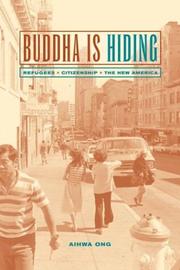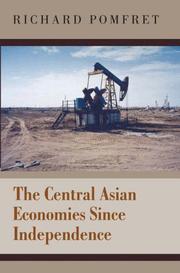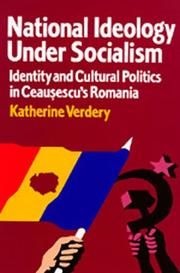| Listing 1 - 4 of 4 |
Sort by
|

ISBN: 0821442678 9780821442678 9781782049920 1782049924 9780821415696 0821415697 9780821415702 0821415700 9780852558614 0852558619 9780852558607 0852558600 9780821415672 0821415670 Year: 2004 Publisher: Woodbridge : Boydell & Brewer, Limited,
Abstract | Keywords | Export | Availability | Bookmark
 Loading...
Loading...Choose an application
- Reference Manager
- EndNote
- RefWorks (Direct export to RefWorks)
A useful collection for students as the interest in the politics of ethnicity continues.
Political anthropology --- Ethnicity --- Democracy --- Ethnic identity --- Group identity --- Cultural fusion --- Multiculturalism --- Cultural pluralism --- Anthropology, Political --- Government, Primitive --- Ethnology --- Political science --- Political aspects --- Anthropological aspects --- POLITICAL SCIENCE / General. --- African identity. --- African politics. --- communal tensions. --- democratic nation-building. --- ethnic tensions. --- ethnicity. --- political challenges. --- religion.

ISBN: 159734513X 9786612762925 0520937163 1282762923 9780520937161 1417522798 9781417522798 0520229983 9780520229983 0520238249 9780520238244 9781597345132 6612762926 9781282762923 Year: 2003 Publisher: Berkeley ; London : University of California Press,
Abstract | Keywords | Export | Availability | Bookmark
 Loading...
Loading...Choose an application
- Reference Manager
- EndNote
- RefWorks (Direct export to RefWorks)
Fleeing the murderous Pol Pot regime, Cambodian refugees arrive in America as at once the victims and the heroes of America's misadventures in Southeast Asia; and their encounters with American citizenship are contradictory as well. Service providers, bureaucrats, and employers exhort them to be self-reliant, individualistic, and free, even as the system and the culture constrain them within terms of ethnicity, race, and class. Buddha Is Hiding tells the story of Cambodian Americans experiencing American citizenship from the bottom-up. Based on extensive fieldwork in Oakland and San Francisco, the study puts a human face on how American institutions-of health, welfare, law, police, church, and industry-affect minority citizens as they negotiate American culture and re-interpret the American dream. In her earlier book, Flexible Citizenship, anthropologist Aihwa Ong wrote of elite Asians shuttling across the Pacific. This parallel study tells the very different story of "the other Asians" whose route takes them from refugee camps to California's inner-city and high-tech enclaves. In Buddha Is Hiding we see these refugees becoming new citizen-subjects through a dual process of being-made and self-making, balancing religious salvation and entrepreneurial values as they endure and undermine, absorb and deflect conflicting lessons about welfare, work, medicine, gender, parenting, and mass culture. Trying to hold on to the values of family and home culture, Cambodian Americans nonetheless often feel that "Buddha is hiding." Tracing the entangled paths of poor and rich Asians in the American nation, Ong raises new questions about the form and meaning of citizenship in an era of globalization.
Cambodian Americans --- Refugees --- Citizenship --- Birthright citizenship --- Citizenship (International law) --- National citizenship --- Nationality (Citizenship) --- Political science --- Public law --- Allegiance --- Civics --- Domicile --- Political rights --- Displaced persons --- Persons --- Aliens --- Deportees --- Exiles --- Cambodians --- Ethnology --- Social conditions. --- Ethnic identity. --- Civil rights --- Social aspects --- Law and legislation --- Oakland (Calif.) --- City of Oakland (Calif.) --- Ethnic relations. --- Américains d'origine cambodgienne --- Réfugiés --- Social conditions --- Ethnic identity --- Conditions sociales --- Identité ethnique --- Family. --- Cambodians. --- Adaptation. --- Refugees. --- Américains d'origine cambodgienne --- Réfugiés --- Citoyenneté --- Droits --- Conditions sociales. --- Identité collective. --- american citizenship. --- american culture. --- american dream. --- american institutions. --- anthropology. --- asia scholars. --- buddhism. --- buddhists. --- california. --- cambodian americans. --- cambodian refugees. --- citizenship experience. --- cultural anthropologists. --- demographic studies. --- ethnic tensions. --- fieldwork. --- globalization. --- minority citizens. --- modern history. --- new america. --- nonfiction study. --- oakland. --- pol pot regime. --- race and class. --- regional history. --- san francisco. --- social sciences. --- southeast asia. --- textbooks. --- welfare. --- Citoyenneté --- Identité collective.

ISBN: 0691124655 0691222509 Year: 2006 Publisher: Princeton Princeton university press
Abstract | Keywords | Export | Availability | Bookmark
 Loading...
Loading...Choose an application
- Reference Manager
- EndNote
- RefWorks (Direct export to RefWorks)
The 9/11 attacks, the U.S. invasion of Afghanistan, and the oil boom of recent years have greatly increased the strategic importance of resource-rich Central Asia, making an understanding of its economic--and therefore political--prospects more important than ever. In 'The Central Asian Economies Since Independence', Richard Pomfret provides a concise and up-to-date analysis of the huge changes undergone by the economies of Kazakhstan, the Kyrgyz Republic, Tajikistan, Turkmenistan, and Uzbekistan since the collapse of the Soviet Union in 1991. The book assesses the economic prospects of each country, and the likelihood that economic conditions will spur major political changes. With independent chapters on each country, and chapters analyzing their comparative economic performance, the book highlights similarities and differences. Facing common problems caused by the breakdown of Soviet economic relations and the hyperinflation of the early 1990s, these countries have taken widely divergent paths in the transition from Soviet central planning to more market-based economies. The book ends in 2005 with the bloodless Kyrgyz revolution and the violence in Uzbekistan, which signaled the end of the region's political continuity. Throughout the book, Pomfret emphasizes the economic forces that foster political instability--from Kazakhstan's resource boom and Turkmenistan's lack of reform to Tajikistan's abject poverty.
330.958 --- 331.30 --- 37 --- CIS / Commonwealth Of Independant States - Gos - Cei --- KG / Kyrgyzstan - Kirghizistan --- KZ / Kazakhstan --- TJ / Tajikistan - Tadzjikistan - Tadjikistan --- TM / Turkmenistan --- UZ / Uzbekistan - Oezbekistan - Ouzbekistan --- 338 <5-011> --- 338 <5-011> Economische situatie. Economische structuur van bepaalde landen en gebieden. Economische geografie. Economische produktie.economische produkten. Economische diensten--Nabije-Oosten. Midden-Oosten --- Economische situatie. Economische structuur van bepaalde landen en gebieden. Economische geografie. Economische produktie.economische produkten. Economische diensten--Nabije-Oosten. Midden-Oosten --- Economische toestand --- Geografische economie. Monografieën van streken en landen --- Asia, Central --- Economic conditions --- Economic policy --- Politics and government --- Economic policy. --- Economic history. --- Central Asia. --- Afghanistan. --- Agip. --- Almaty. --- Aral Sea. --- Azerbaijan. --- Bishkek. --- Caspian Sea. --- Chevron. --- Daewoo. --- Dutch disease. --- Fergana oblast. --- Ferghana Valley. --- Gini coefficent. --- Islamic Renaissance Party (IRP). --- Japan. --- Karachaganak. --- Karakalpakstan. --- Kumtor gold mine. --- Mongolia. --- Nazarbayev, Nursultan. --- North Korea. --- Osh. --- Pakistan. --- South Korea. --- Tajikistan. --- Tashkent. --- Tengiz. --- Turkey. --- Turkmenbashi. --- Ukraine. --- Uzbekistan. --- World Bank. --- aluminium. --- corruption. --- enclaves. --- ethnic tensions. --- external debt. --- financial sector. --- forced labor. --- household surveys. --- hydroelectricity. --- income distribution. --- inflation. --- irrigation. --- migration. --- natural gas. --- opium. --- pensions. --- poverty. --- privatization. --- remittances. --- ruble zone. --- shuttle trade. --- transit. --- unemployment. --- History, Economic --- Economics --- Economic nationalism --- Economic planning --- National planning --- State planning --- Planning --- National security --- Social policy --- Central Asia --- Soviet Central Asia --- Tūrān --- Turkestan --- West Turkestan --- Asia --- Political aspects

ISBN: 0520917286 0585128804 9780520917286 9780585128801 0520072162 0520203585 Year: 1995 Publisher: Berkeley, Calif. University of California Press
Abstract | Keywords | Export | Availability | Bookmark
 Loading...
Loading...Choose an application
- Reference Manager
- EndNote
- RefWorks (Direct export to RefWorks)
The current transformation of many Eastern European societies is impossible to understand without comprehending the intellectual struggles surrounding nationalism in the region. Anthropologist Katherine Verdery shows how the example of Romania suggests that current ethnic tensions come not from a resurrection of pre-Communist Nationalism but from the strengthening of national ideologies under Communist Party rule.
Intellectuals --- Regions & Countries - Europe --- History & Archaeology --- Balkan Peninsula --- Intelligentsia --- Persons --- Social classes --- Specialists --- Ceaușescu, Nicolae. --- Tsʹeʼoshesḳo, Niḳoleye --- Tseaouseskou, Nikolae --- Tshāwshīskū, Nīqūlāy --- Chʻi-ao-sai-ssu-kʻu --- Chaushesku, Nikolae --- Chaushesuku, Nikorae --- Ceaușescu, Niculae --- צ׳אושסקו, ניקולאי --- Romania --- Government of Romania --- Lo-ma-ni-ya --- Luomaniya --- R.N.R. --- R.P.R. --- R.P. Romînă --- R.S.R. --- Republica Populară Romînă --- Republica Socialistă România --- Rhowmenia --- RNR --- Román Szocialista Köztársaság --- Romāniyā --- Romanyah --- Roumania --- Roumanie --- RP Romînă --- RPR --- RSR --- Rumania --- Rumänien --- Rumenyah --- Rumenye --- Rumunia --- Rumŭnii︠a︡ --- Rumunsko --- Rumynii︠a︡ --- Rumynskai︠a︡ Narodnai︠a︡ Respublika --- Румыния --- ルーマニア --- 羅馬尼亞 --- 루마니아 --- Moldavia --- Wallachia --- Cultural policy. --- Politics and government --- Intellectual life --- 20th century eastern european history. --- 20th century eastern european politics. --- anthropology. --- communism. --- communist party rule. --- cultural production. --- cultural studies. --- dogmatism. --- eastern european history. --- eastern european society. --- elitism. --- ethnic tensions. --- marxism. --- national ideology. --- nationalism. --- political history. --- pre communist nationalism. --- presocialist romania. --- real socialism. --- reassertion. --- romania. --- romanian history. --- socialism. --- society and culture in east central europe series. --- state formation. --- suppression. --- universality. --- Royaume de Roumanie
| Listing 1 - 4 of 4 |
Sort by
|

 Search
Search Feedback
Feedback About UniCat
About UniCat  Help
Help News
News